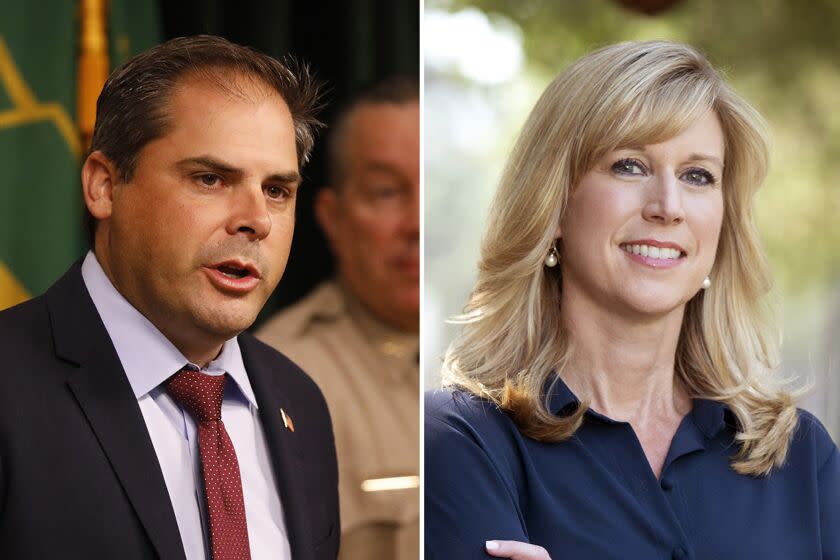GOP Rep. Mike Garcia wins northern L.A. County race, giving Republicans control of the House

- Oops!Something went wrong.Please try again later.
Republican Rep. Mike Garcia has won reelection to his northern Los Angeles County seat, dashing Democrats' hopes they could reclaim a district where they had a sizable registration advantage. His win pushed Republicans to the majority in the next Congress.
Garcia defeated Christy Smith, a Democratic former state lawmaker whom he had bested in a 2020 special election race and again later that year, when he won by just 333 votes. The Associated Press called the race Wednesday, though official results will take longer.
“It will be an honor for me to represent you in the majority," Garcia said in a written statement. "I look forward to delivering all forms of security for our district and our nation, whether you voted for me or not.”
Smith thanked donors and volunteers, and said on social media: "There is so much more work to be done to reach voters here who no longer see the value of their vote. I know that work will continue in the hands of very dedicated local Democrats."
Going into the midterm cycle, California’s 27th Congressional District was a tantalizing pickup opportunity for Democrats. Republicans had represented the area, which includes the Antelope Valley and Santa Clarita, for decades before the 2018 blue wave broke the GOP’s streak.
Though Garcia flipped the seat back to Republican control after the Democratic incumbent resigned, redistricting and changing demographics made the area appear friendlier for Democrats. The party has a double-digit registration advantage in the redrawn seat, which backed Joe Biden over Donald Trump in the 2020 presidential race by 12 points.
Despite the Democratic tilt of the district, however, residents' frustrations with climbing gas prices and the high cost of living gave Garcia the edge. He also touted his background as a Navy pilot, which resonates in this region with long ties to the military and aerospace industry.
Garcia, 46, puzzled many political observers when, on Jan. 6, 2021, he objected to counting the electoral college votes in Arizona and Pennsylvania, joining 146 other House Republicans. The vote occurred just hours after a mob of Trump's supporters overran the U.S. Capitol and assaulted police officers in an attempt to block Biden's win. While Garcia had plenty of company in the House GOP conference, few others were in competitive districts.
Democrats signaled early that they would highlight Garcia's vote in their campaign against him, and the congressman initially appeared on the defensive. But the focus in the race gradually shifted to other issues that drove the 2022 midterms: the economy and abortion rights. Garcia's ads emphasized low taxes and his work on behalf of veterans, while Smith emphasized Garcia's support for a nationwide abortion ban.
Smith, 53, raised $3.5 million for her campaign through mid-October, a considerable sum for a challenger. But the former state assemblywoman got little help on the airwaves from Democratic campaign committees and outside groups, which largely avoided the expensive Los Angeles media market.
On Sunday, Smith said in a long Twitter thread that "our campaign got next to zero outside resources to fight this battle."
"When it comes to paid comms on TV, digital and mail, without DC help to define Garcia and elevate our positive agenda, we didn't stand a chance," Smith said. She added that with the possibility that the district would be "the tipping point to hold the House, the utter lack of investment made no sense."
As the incumbent, Garcia had the fundraising edge, bringing in more than $6.5 million. He also got a boost from the House Republican campaign arm and the super PAC aligned with House GOP leader Kevin McCarthy. In all, Garcia and his allies spent more than $7 million on television and digital advertising, while Smith spent just shy of $1 million.
Times staff writer Seema Mehta contributed to this report.
This story originally appeared in Los Angeles Times.

